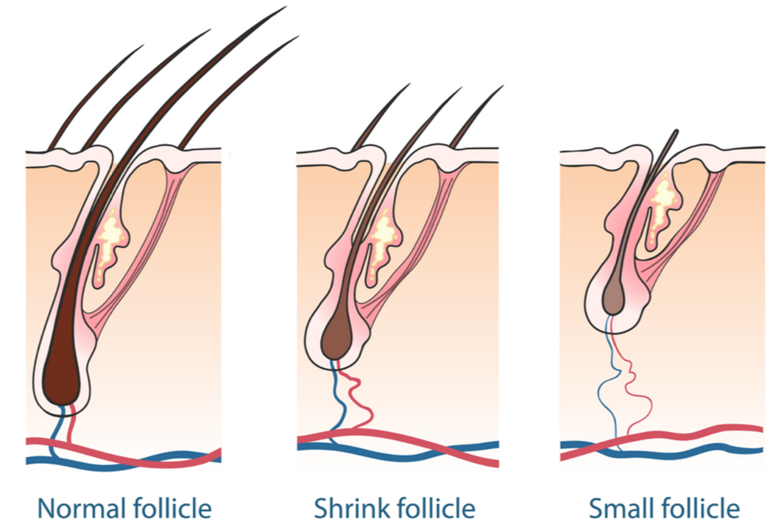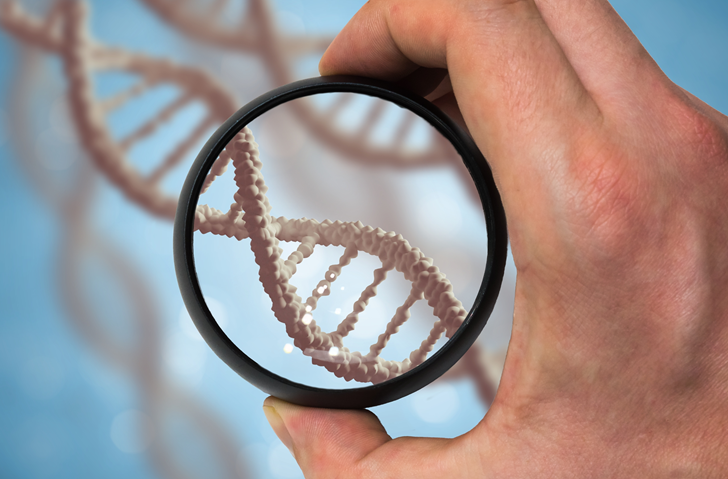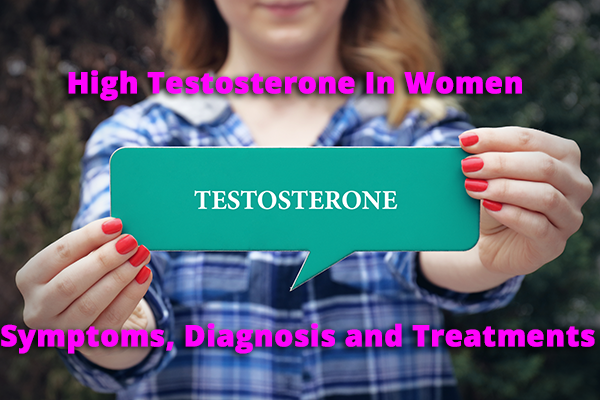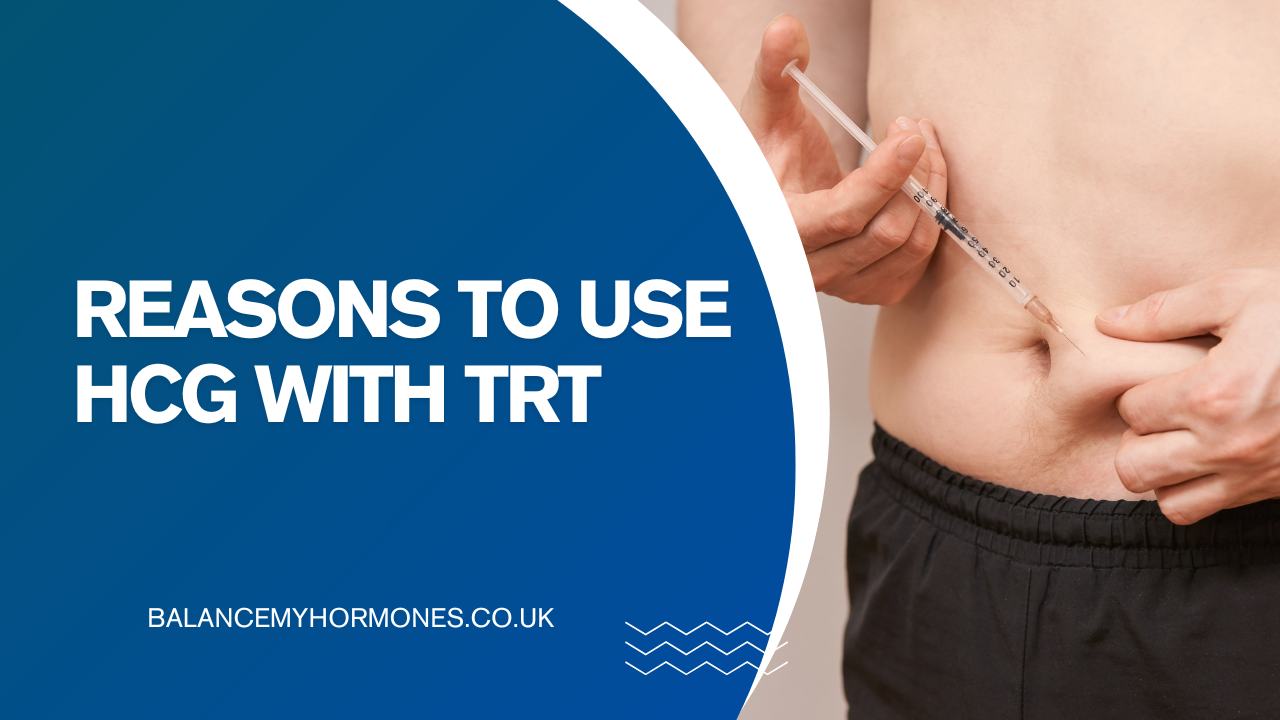
By Mike Kocsis | 7 minutes read | Last updated: May 26, 2025 Categories: Testosterone
Medically Reviewed by Dr. George Touliatos
According to the NHS, men’s normal testosterone levels decrease by 1% every year from the age of 30.
All across the world, millions of men have found a solution to low testosterone through a treatment called testosterone replacement therapy (TRT).
With the increase in awareness of testosterone levels, TRT has become more common. Even celebrities such as Joe Rogan and Mel Gibson utilise the treatment TRT.
If you’re considering TRT, you’ve likely done some research and encountered the term ‘hair loss’ more than a few times.
This can be concerning, but don’t fear, taking TRT is not a one-stop road to hair loss.
Understanding the connection between testosterone and hair health is crucial to making an informed decision about TRT.
Testosterone, and particularly its more potent form dihydrotestosterone (DHT), can have significant effects on hair growth/loss. We’re here to let you know all about it.
Will increased levels of testosterone cause hair loss?
Testosterone is responsible for the development of secondary sexual characteristics in men. Additionally, this male sex hormone keeps you healthy in a variety of ways, and that extends to hair growth, bone strength, muscle mass, mental state, motivation, focus, and other factors as well.
Without the right level of testosterone, you can really suffer.
So, it stands to reason that without the proper amount of testosterone, a male may experience hair loss as a result, among other symptoms as well.
However, there is a belief that testosterone injections cause a reduction in the healthy hair follicles of the male body. This is then thought to lead to male pattern baldness (androgenetic alopecia) and hair loss.
The theory behind this is somewhat complex and the number of studies conducted in the area are limited.
The main argument is that natural testosterone, when combined with other elements of the TRT treatment, affects the natural predisposition of the hair follicles on the head and other areas of the body.
Thus, testosterone injections could be indirectly responsible for hair loss during TRT.
Is DHT the cause of hair loss?
The theory for TRT causing increased baldness seems to be based on the assumption that an increase in testosterone in the body leads to an increase in the production of DHT.
DHT is a synthetic form of testosterone in your body. It’s usually created when testosterone combines with other elements in your body.
DHT is known for regulating many areas of the body. It is also known to reduce the size of the hair follicles and, eventually, diminish hair growth.
For men who are receiving testosterone injections or are looking into TRT, this can be concerning.
Since DHT is known to cause a reduction in size and effectiveness of hair follicles in men, many believe that the increase in testosterone during TRT will cause your body to produce more DHT, thus accelerating the loss of your hair.
What about genetics?
Your genes play the most important role in determining whether you will have hair loss leading to male pattern baldness (androgenic alopecia) or not.
The AR gene is responsible for encoding the androgen receptor, which plays a crucial role in how your body responds to androgens (male hormones like testosterone).
If your hair follicles (the tiny pockets in your skin where your hair grows) are very sensitive to DHT, even a small amount of it can cause your hair to fall out even if you are a teenage male.
In people with this sensitivity, DHT can shrink the hair follicles and make it harder for hair to grow.
The sensitivity to DHT is due to your genes. Specifically, certain variations in the AR gene make your hair follicles more sensitive to DHT.
If you inherit these variations, your hair follicles may react more strongly to DHT, which can lead to hair loss. So, the sensitivity is genetically determined and can be passed down from your parents.
Watch our YouTube video on “Will TRT cause hair loss?” for further explanation:
What does science say about hair loss and TRT?
Scientific studies suggest that men who undergo TRT may experience accelerated hair loss, especially if they are already genetically predisposed to baldness.
On the other hand, some men may notice increased body hair or facial hair growth due to the rise in testosterone.
It’s important to note that the relationship between TRT and hair loss can vary depending on individual genetics.
As the urologist Dr. Rena Malik explains, “Could testosterone replacement speed up male pattern hair loss? Absolutely. But likely it’s because you’re already genetically predisposed to getting hair loss.”
It’s important to remember that everyone is different and people will likely have varying results based on their genetic makeup and other health factors.
It’s not a guarantee that you won’t experience hair loss when you begin a new treatment. However, there is no data or science to suggest that it would be the result of testosterone injections.
Hair loss in men is mainly caused by genetic makeup. This is the only real way of knowing if you are likely to suffer from male pattern baldness.
Causes of baldness in men
Here are some of the possible reasons for hair loss or hair shedding during testosterone therapy.
Stress
One of the most common reasons that men experience hair loss is stress.
If you are experiencing a stressful time in your professional or personal life around the time that you start a low testosterone treatment, then that could trigger hair loss.
You should manage stress healthily if you wish to keep a full head of hair for longer.
Natural ageing process
Though not every man will be pleased to hear it, sometimes, hair loss is just an effect of the natural ageing process.
As you age, there will be several effects on your body that are unpleasant. Hair loss can certainly be one of them.
Though you cannot fight the process of natural ageing, there are things that you can do as you age to slow the effects.
This includes learning how to manage stress, eating better, exercising more, and generally taking care of your body as you age.
Low testosterone
Low testosterone (low T) or male hypogonadism can also cause hair loss or hair thinning.
Testosterone is largely responsible for a lot of different important functions in men. When your body is low on testosterone, it can wreak havoc on many processes in the body.
Ironically, you can experience these symptoms for up to a few days after you have started treatments for it, so you shouldn’t be too worried.
If you have not experienced treatments for low T as of yet, consider these treatments if you wish to combat the effects of having low testosterone (which include hair loss and hair thinning).
Treatment shock
If your body has had low testosterone for a while, the shock of the treatment and the increased levels of testosterone could cause some unintended symptoms. One of the common side effects of this happening is a loss or thinning of some hair.
This is not an ideal situation, but you should know that it is typically short-term.
In the long run, testosterone injections are very effective in treating low testosterone and the side effects that come along with it.
Genetics
Genetics are considered the primary factor at play when it comes to male pattern baldness. If male pattern baldness runs in your family then it’s likely you too will suffer.
Though it’s not convenient, sometimes there is nothing that we can do to stop genetics. There are artificial treatments that can be done, but testosterone generally will not assist in this.
Male pattern baldness is most common around the age of 25-40. This is often the time when people consider TRT, and it causes them to assume it is the TRT causing hair loss when, in fact, it is simply just their genetics and they would have experienced male pattern baldness whether on TRT or not.
How to prevent hair loss on TRT?
If you have a higher sensitivity to DHT, you may experience hair loss after starting TRT. Here are the popular hair loss treatment options men try to avoid or treat hair loss:
Minoxidil
Minoxidil is an approved medication used for hair regrowth in men and women experiencing hereditary hair loss.
It works by increasing blood flow to the scalp, which stimulates hair growth. In the hair growth cycle, it extends hair growth phase.
This medicaton widens the blood vessels in the area where it’s applied, allowing more oxygen, blood, and nutrients to reach the hair follicles.
Minoxidil comes in the form of tablets, foam, lotion or solution that is applied directly to the scalp.
Finasteride or DHT blocker
Finasteride is a prescription medication that blocks the enzyme responsible for converting testosterone into DHT.
By reducing DHT levels, oral finasteride can help prevent hair follicles from shrinking and protect against further hair loss.
It’s often used in conjunction with TRT for men who are experiencing hair thinning or baldness.
Natural remedies
Rosemary oil is popularly used to reduce hair thinning and enhance hair growth. Studies also prove its effectiveness.
Other helpful natural remedies that may help reverse hair loss include scalp massage, castor oil and saw palmetto. Taking testosterone boosting foods may also help you improve hair loss if you are experiencing this issue due to low T.
Healthy lifestyle
Eat a balanced diet rich in vitamins and minerals (especially those that support hair health like biotin, zinc, and iron) to improve overall body hair growth.
Hair transplant
For individuals experiencing significant hair loss, hair transplantation may be an effective solution.
This surgical procedure involves moving hair follicles from areas with dense hair growth to thinning or bald areas on the scalp. It offers permanent results and can restore a natural-looking hairline
Should you get TRT?
TRT is an effective treatment that has helped countless men reduce their low testosterone symptoms and improve their life quality.
While TRT comes with both benefits and risks, the TRT advantages tend to be more impactful for those suffering from low testosterone. It can greatly enhance energy levels, mood, and physical well-being.
If you’re looking to improve your quality of life and manage symptoms effectively, TRT could be a valuable option to explore with your medical professional.
Summing it up
Testosterone replacement therapy (TRT) offers a transformative solution for men suffering from low testosterone. It improves your overall health as well as your quality of life.
While concerns about male hair loss are common, scientific evidence suggests that TRT does not directly cause hair loss. Instead, factors such as genetics, stress, and ageing play more significant roles.
By managing these factors and consulting with healthcare professionals, you can enjoy the numerous benefits of TRT without undue fear of significant hair loss.
If you’re thinking about getting TRT for men or just would like more information on the treatment, get in touch with us.
Here at Balance My Hormones, our specialised doctors can assess your symptoms and create a bespoke treatment plan to suit your specific needs.
References
Heidelbaugh, J.J. and Belakovskiy, A., 2024. Testosterone replacement therapy for male hypogonadism. American Family Physician, 109(6), pp.543-549.
Luther, P.M., Spillers, N.J., Talbot, N.C., Sinnathamby, E.S., Ellison, D., Kelkar, R.A., Ahmadzadeh, S., Shekoohi, S. and Kaye, A.D., 2024. Testosterone replacement therapy: clinical considerations. Expert Opinion on Pharmacotherapy, 25(1), pp.25-35.
Evidence Based Research
This article has been researched and written based on scientific evidence and fact sheets that have then been crossed checked by our team of doctors and subject matter experts.
References, sources and studies used alongside our own in-house research have been cited below, most of which contain external clickable links to reviewed scientific paper that contain date stamped evidence.
Our team of healthcare experts and GMC registered doctors are licensed to UK GMC standards. We strive to provide you with the latest evidence based, researched articles that are unbiased, honest and provide you with accurate insights, statistics and helpful information on the discussed topic to ensure you gain a better understanding of the subject. You can read more about our Editorial Process by clicking here.
We value your feedback on our articles, if you have a well-researched paper you would like to share with us please contact us.
Quick Low Testosterone Test
If you know your total testosterone reading from a previous blood test input the results to the left above to see if your testosterone levels are normal.
Low Testosterone Levels
You may have low testosterone depending on the symptoms you have, please contact us to find out how we can help.
Please Retry
The Total Testosterone Level You Entered Is Incorrect. Figure Must be in nmol/L you can use our converter here.
Normal Testosterone Levels
Your testosterone levels appear to be in the normal range.
LOOKING GOOD!
You must be over 38, have had your ovaries removed or have suffered with premature menopause to warrant further hormone tests.
Further investigation needed
Please contact us to discuss your hormones, we need your total testosterone levels to validate your hormone deficiency. You can order a blood test here.
Low Testosterone Levels
You may have low testosterone depending on the symptoms you have, please contact us to find out how we can help.
High Testosterone Levels
You appear to have higher than normal testosterone levels, please contact us for further investigation.
Normal Testosterone Levels
You appear to have normal testosterone levels. Contact us if you have any concerns.


 Mike Kocsis has an MBA with a focus on healthcare administration and is an entrepreneur and medical case manager for Balance My Hormones which offers medical services in the UK and Europe. Mike has over 20 years of experience in the healthcare sector, much of that working with people who have hormone imbalances. Mike has appeared on
Mike Kocsis has an MBA with a focus on healthcare administration and is an entrepreneur and medical case manager for Balance My Hormones which offers medical services in the UK and Europe. Mike has over 20 years of experience in the healthcare sector, much of that working with people who have hormone imbalances. Mike has appeared on 

